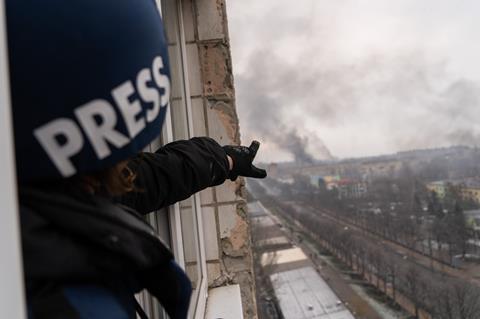The world watched in horror at footage despatched by Associated Press journalist Mstyslav Chernov, as Russia besieged and bombarded the city of Mariupol in February 2022. Screen talks to him about the feature documentary that resulted.

It was never expected to be a crowdpleaser, but Mstyslav Chernov’s 20 Days In Mariupol won the audience award at Sundance in January and was still topping audience polls at International Documentary Film Festival Amsterdam 10 months later. Sold globally by Dogwoof, this brutal, Ukrainian-made documentary — which is the country’s submission to the best international feature Oscar — is set in the eastern port city of Mariupol as it comes under siege from Russian forces in February 2022. Chernov was there with a team from news agency Associated Press (AP) recording the death, destruction and misery — and the only international team getting news out to the world.
The director’s voice can be heard on the soundtrack but what is not revealed is how he and his colleagues — photographer Evgeniy Maloletka and producer Vasilisa Stepanenko — were themselves coping when the cameras were not rolling.
“It’s a good question because when we were making the film and editing, we thought about how much of our own backstage and life we should put in,” recalls the director from Kharkiv, Ukraine, who shared a Pulitzer prize this year with Maloletka, Stepanenko and reporter Lori Hinnant. “Ultimately, we decided not to use that footage because we didn’t want to take attention from people whose stories we were trying to tell.”
When Chernov and his team first arrived in Mariupol, just before the siege began, they prepared places to stay in different locations across the city. They started off in a hotel but eventually their main base became a hospital.
“You basically just dropped your sleeping bag on the floor among all the patients,” the director remembers. They slept in corridors, away from the windows. It was not a restful environment. The hospital was running out of painkillers and they could hear the patients in agony. The bombing was relentless, and there were very few nurses.
“It was difficult from a practical perspective, and it was difficult from a psychological perspective,” Chernov says with understatement. When they were not filming, he and his colleagues were carrying food around the hospital (“buckets of soup”) and helping move patients (the elevators were not working).
Chernov — who over the years has worked as videographer, photographer, photojournalist and war correspondent, and is a published novelist — is used to being in war zones. He has worked for AP since 2014, just before Russia first invaded Ukraine. He ticks off places he has visited: Iraq, Afghanistan, Syria, Nagorno-Karabakh and Gaza. “I’ve seen many conflicts, wars and revolutions.”
Chernov’s job generally is to file short news reports that will often be broadcast the same day. He wanted, however, to probe much deeper. “What happens to human beings during these traumatic events is so complex,” he says. “Of course, I had so many questions about human nature, the nature of journalism and the nature of war.”
The filmmaker also felt a sense of historical mission. “At the time the city got surrounded, we realised we were the only ones reporting from there. I realised we needed to film everything.”
Bigger canvas
As the siege progressed, Chernov says he thought more and more about distilling his work into a feature documentary. “After the Mariupol maternity hospital bombing, I understood that this was such a symbolic, important and deep story that it would need a bigger form to be told. From that time, I thought that if I made it out alive and we managed to get all the footage out, there will someday be a film.”
Chernov was aware AP had a partnership with PBS Frontline through which they had made documentaries together before. When he got out of Mariupol, Chernov began speaking about the film and starting to develop it. “It is not the first time a film has been assembled out of some news footage,” he explains. “The difference with this one is that everything was filmed by me and the film is then directed by me — so it is a much more personal vision which is not usual for AP or Frontline. But for this specific story, it was logical that I would be the voice to tell this story.”
The basis of the film is an article Chernov wrote for AP with the same title, 20 Days In Mariupol, partly based on his diaries. The filmmaker has learned some “bitter lessons” in his years of conflict journalism. One is that however important or tragic and heartrending a story appears, the news cycle moves on quickly. “You film it, you tell it and a few days later people forget about it. That was always so frustrating to me.”
Documentaries have a longer shelf life, and Chernov talks of trying to “save this story from being washed away by the sea of information”.
One of the doctors shown in the documentary observes that human nature becomes magnified during wartime. “When I heard the doctor saying that, I thought, ‘This is exactly what I think too after all the wars I went through. It’s very true,’” Chernov reflects. “But it’s not only about individuals showing their true nature. It’s also about deeper processes in our society that come out. The society and our country does show its face during the war as much as the individual would.”
Chernov has a family of his own. In the documentary, he briefly mentions his daughters. Ask him what he feels about being away from them, and in so much danger, when he is on assignment, and he replies deadpan: “Being a war journalist does not make your family life easier.” He pauses before adding: “The truth is that it’s quite devastating for the family and for personal life… but all humans have families. As difficult as it is [to be separated from family], I don’t see it as something out of normality for the modern world.”
Chernov adds that he mentions his own family in the film simply because “family, children, the feeling of loss and love is the most important theme of the film”.
Released in US cinemas by PBS and in the UK by Dogwoof, 20 Days In Mariupol has connected with cinema audiences in Ukraine itself, grossing $56,000 — the biggest ever box office in the country for a non-concert film documentary. This seems surprising on one level — audiences know the story it is telling. They are part of that story and surely would not want to relive it through a movie. Chernov reflects on why his film might be striking a chord in his home country. “Recently, there were a number of fiction films on the war that were released in Ukraine and they did not have a warm reception from the audience,” he says. “[But] the country and the society value honest documentary work.
“When we had screenings in Ukraine where the whole theatre was full of Mariupol residents who had lost their city maybe forever, I thought they would be retraumatised when they saw the film. I was quite worried about that.
“But I saw that this film helped them to start their psychological treatment. [The film] is important as a start of collective treatment of the Ukrainians who suffered this trauma and loss.”

























No comments yet